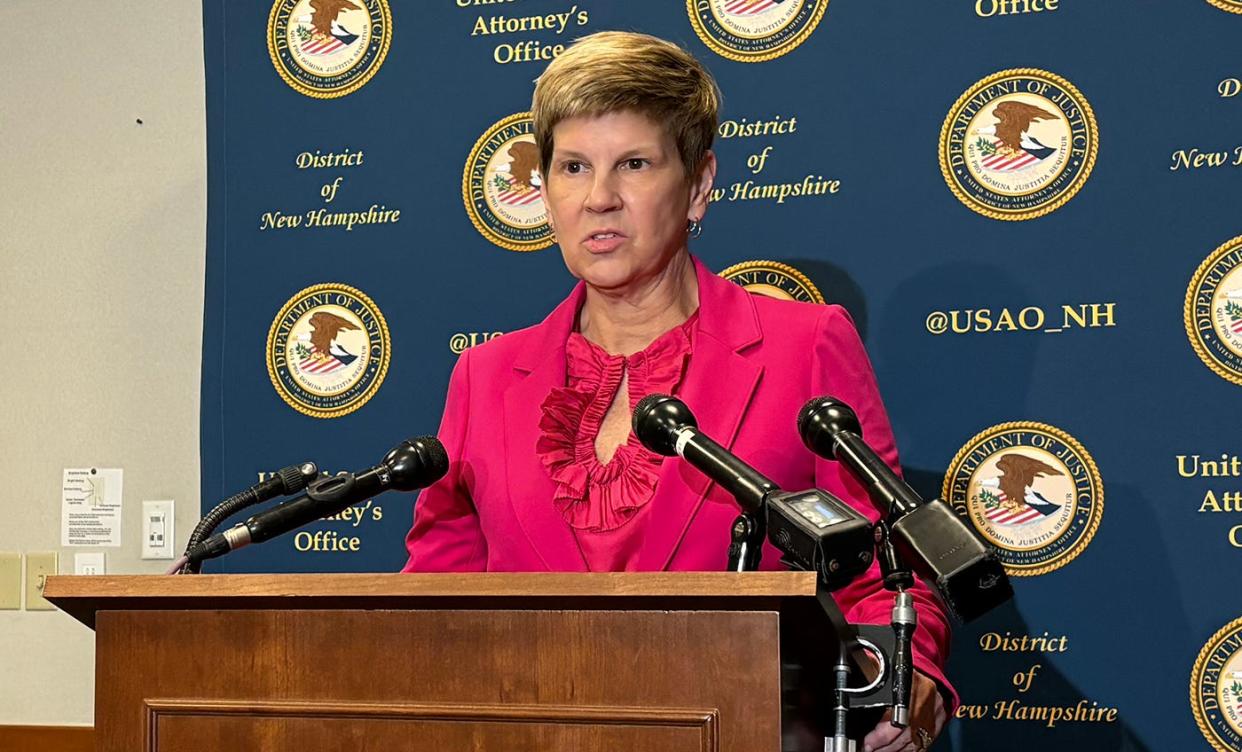Trial begins for Dover man accused of texting death threats to presidential candidates
CONCORD — The trial of a Dover man charged with sending death threats to the campaigns of three presidential candidates the month before the 2024 New Hampshire Primary, opened in federal court Monday.
Tyler Anderson was arrested at his residence in Dover in December and charged with threatening to kill 2024 Republican presidential candidate Vivek Ramaswamy at an event in Portsmouth. He was later found to have sent similar messages to the campaigns of former South Carolina Gov. Nikki Haley and former New Jersey Gov. Chris Christie.

Anderson was indicted on three federal counts of transmitting in interstate commerce a threat to injure the person of another.
Anderson’s case began Monday before Judge Samantha Elliott. He is being represented by assistant federal public defender Dorothy Graham. Assistant U.S. Attorneys Charles Rombeau and Matthew Vicinanzo are the prosecutors.
Alleged threats came in response to text solicitations

Anderson was charged for a text he sent in response to a text message from Ramaswamy’s campaign inviting recipients to a breakfast meet and greet at the Roundabout Diner in Portsmouth.
“Another opportunity for me to blow his brains out,” the text read. “I’m going to kill everyone who attends and then [expletive] their corpses.”
In addition to this text, Anderson is also being charged for texts he allegedly sent in response to messages from Haley and Christie’s campaigns.
In September, Anderson responded to a text inviting recipients to a Chris Christie event at Franklin Pierce University with a threat to “blow the bastard’s head off.”
“I hope you have the stamina for a mass shooting,” another text read.
And, in November, he texted that Nikki Haley “deserves to be impaled with a red hot spike” and that “disembowelment would work too” in a response to one of her campaign texts.
The line between free speech and criminal threatening
In the prosecution's opening statement, Vicinanzo said while the U.S. values free speech and political discourse, including political disagreement, “there are some lines you just can’t cross.”
Situations that cross the line, he said, include things like shouting fire in a crowded building and threatening violence to another person.
The last one, he said, is what Anderson did.
Vicinanzo also said Anderson received 40 political texts over the course of two years and that he only texted "stop" once.
Each charge against Anderson carries a sentence of up to five years in prison, up to three years of supervised release, and a fine of up to $250,000.
Anderson has pleaded not guilty. Judge Elliot said that to be found guilty beyond a reasonable doubt, the jury would need to find that he sent a communication, intended to send it, and disregarded the risk that someone would take the communication as a real threat to harm someone.
Anderson says he thought he was responding to bots
Graham said Anderson should not be found guilty because he believed that computers or “bots” were generating the texts, and that he wasn’t aware that any person would be reading them.
“'I thought they were automated texts. I didn’t think my texts would be processed,'” Graham said in her opening statement. “That’s what he told the agents, and that’s what he believed.”
Graham said Anderson was receiving many texts from campaigns that would not stop even when he texted “stop,” leading him to further believe that no one was on the other end.
She also said the texts, which were accompanied by emojis and photos, were so "over the top" and "vulgar" that they were not "serious communications."
The rules around campaign texting
The prosecution brought forward five witnesses on Monday.
The first was Danielle Evansic, a science and math teacher at Holy Family Academy, who also worked full-time as a volunteer coordinator at the Ramaswamy campaign in New Hampshire. Part of her job was clicking send on campaign-related text messages to New Hampshire residents.
According to rules set by the Federal Communication Commission, political campaigns are required to get consent from recipients before sending out automated texts. However, if the sender does not use automated messaging, they can send texts without the recipient’s consent.
At the Ramaswamy campaign, Evansic and about a dozen others working for the campaign in New Hampshire would send out texts individually by pushing a button using a software called Campaign Sidekick.
The software would also allow them to see messages sent back to them going back a couple days which they could respond to. Evansic said they would usually be asking about other events or asking to be removed from the text list.
On Dec. 8, 2023, she encountered Anderson's responses to the campaign’s text. The “threatening” messages “caused alarm” for her, she said. She alerted people higher up at the campaign, including Zachary Letourneau, the regional political director for the Ramaswamy campaign in New Hampshire.
Letourneau said while he was not personally worried about any actual danger to the campaign, professionally, any threat is credible. The campaign took extra steps to ensure safety, like requiring a police detail at every campaign event and providing Ramaswamy with a bulletproof vest. Ramaswamy was on “high alert” and “guarded” after the texts, he said.
Witnesses from the Haley and Christie campaigns also used messaging software to send campaign texts to recipients, but the witnesses were not involved in reviewing messages. John Hall, a digital consultant who worked on Haley’s campaign, said the messages were sent out by phone agents in places like Colorado and Alabama clicking through to send messages. In response to questioning by defense attorney Graham, he said he has concerns about the political process that some technology is being abused by campaigns, like that they won’t stop sending messages after a recipient texts “stop.” He said that was not the case at the Haley campaign.
Neither the Haley nor the Christie campaign knew about Anderson's messages to them until after Anderson was arrested and the FBI was investigating his other texts.
The FBI examination
FBI Special Agent Adam Howe, the prosecution’s third witness, said he was notified of the messages around 10:30 p.m. on Dec. 8. A little before 1 p.m. the next day he, along with Dover and Portsmouth police, executed a search warrant and arrested Anderson at his house.
The prosecution played a video from the interview with Anderson after his arrest, where he acknowledged that he went into “graphic detail” and that the messages were “over the top” but “effective.”
Howe said he understood Anderson to be saying that sending those texts was his way of getting the campaigns to stop sending messages. However, Anderson also said in the video he didn’t think the texts would be processed and referenced automated texts.
Trial to end this week
The prosecution will bring forward more witnesses on Tuesday.
The trial is likely to end this week. Judge Elliot told the jurors at the end of the day Monday that it’s possible the trial will wrap up on Tuesday.
This article originally appeared on Portsmouth Herald: Dover man on trial for texting death threats to presidential candidates
